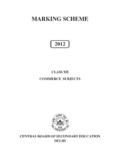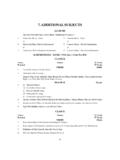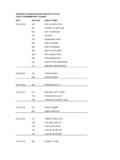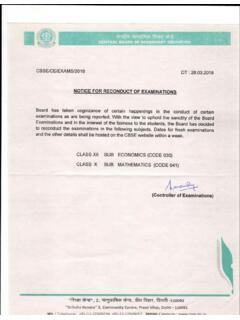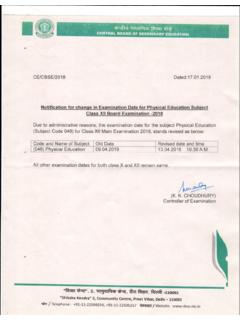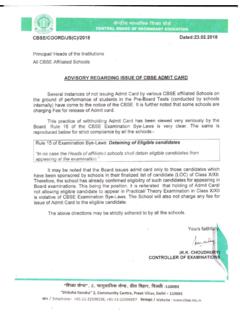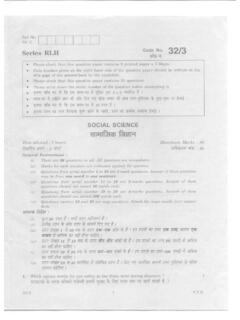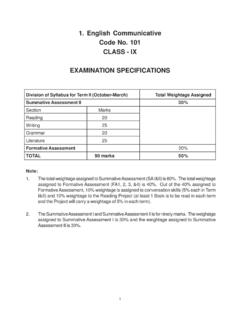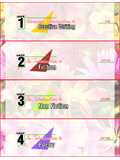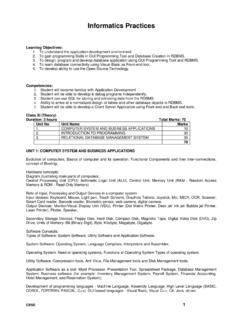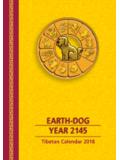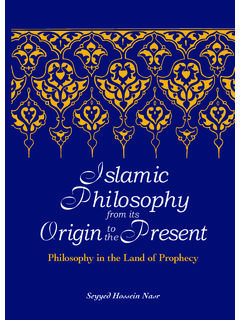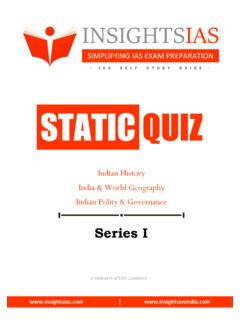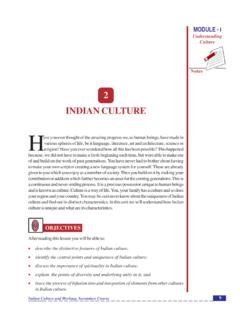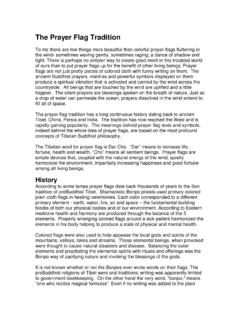Transcription of A TEXT BOOK OF PHILOSOPHY - CBSE
1 CENTRAL BOARD OF SECONDARY EDUCATIONPREET VIHAR, DELHI - 110092(SERIES - I)(SERIES - I)PHILOSOPHYA TEXT BOOK OFClass XISCIENTIFIC METHODAND LOGICAL REASONINGCENTRAL BOARD OF SECONDARY EDUCATIONPREET VIHAR, DELHI - 110092 Class XIClass XIEditor : BHATTE ditor : BHATTINTRODUCTION TOINTRODUCTION TOPHILOSOPHY TEXT BOOK SERIES-IPhilosophy Text Book Series-I : Class - XIOctober - 2011 : First EditionNo. of Copies : 1,50,000 CBSEP aper used : 70 gsm CBSE watermark Maplitho PaperPrice : BY:The Secretary, Central Board of Secondary Education, Shiksha Kendra, 2, Community Centre, Preet Vihar, Delhi - 110301 DESIGN & LAYOUT : Multi Graphics, 5745/81, Reghar Pura, Karol Bagh, New Delhi - BY :This book or part thereof may not be reproduced by any person or agency in any manner.
2 BhattKrishna JainAshwani KumarManju PanditSneh KhoslaAnita KhoslaBoard of ContributorsBoard of ContributorsTHE CONSTITUTION OF INDIAPREAMBLE1WE, THE PEOPLE OF INDIA, having solemnly resolved to constitute India into a SOVEREIGN SOCIALIST secular DEMOCRATIC REPUBLIC and to secure to all its citizens :JUSTICE, social, economic and political;LIBERTY of thought, expression, belief, faith and worship;EQUALITY of status and of opportunity; and to promote among them all 2 FRATERNITY assuring the dignity of the individual and the [unity and integrity of the Nation]; IN OUR CONSTITUENT ASSEMBLY this twenty-sixth day of November, 1949, do HEREBY TO OURSELVES THIS CONSTITUTION OF INDIAC hapter IV AFundamental DutiesARTICLE 51 AFundamental Duties - It shall be the duty of every citizen of India-(a)to abide by the Constitution and respect its ideals and institutions, the National Flag and the National Anthem;(b)to cherish and follow the noble ideals which inspired our national struggle for freedom;(c)to uphold and protect the sovereignty, unity and integrity of India;(d)to defend the country and render national service when called upon to do so;(e)To promote harmony and the spirit of common brotherhood amongst all the people of India transcending religious, linguistic and regional or sectional diversities.
3 To renounce practices derogatory to the dignity of women;(f)to value and preserve the rich heritage of our composite culture;(g)to protect and improve the natural environment including forests, lakes, rivers, wild life and to have compassion for living creatures;(h)to develop the scientific temper, humanism and the spirit of inquiry and reform;(i)to safeguard public property and to abjure violence;(j)to strive towards excellence in all spheres of individual and collective activity so that the nation constantly rises to higher levels of endeavour and , by the Constitution (Forty-Second Amendment) Act. 1976, sec. 2, for "Sovereign Democratic Republic ( ) , by the Constitution (Forty-Second Amendment) Act. 1976, sec. 2, for "unity of the Nation ( )Hkkjr dk lafo/kum sf'kdkge] Hkkjr ds yksx] Hkkjr dks ,d ^ izHkqRo&laiUu lektoknh iaFkfujis{k yksdra=kkRed ; cukus ds fy,] rFkk mlds leLr ukxfjdksa dks%lkekftd] vkfFkZd vkSj jktuSfrd U;k;]fopkj] vfHkO;fDr] fo'okl] /eZvkSj mikluk dh Lora=krk]izfr"Bk vkSj volj dh lerk2izkIr djkus ds fy,] rFkk mu lc esa] O;fDr dh xfjek vkSj jk"V dh ,drk vkSj v[ lqfuf'pr djus okyh ca/qrk c<+kus ds fy, n`<+ladYi gksdj viuh bl lafo/ku lHkk esa vkt rkjh[k 26 uoEcj] 1949 bZ dks ,rn~}kjk bl lafo/ku dks vaxh r] vf/fu;fer vkSj vkRekfiZr djrs gSaA1-lafo/ku (c;kyhloka la'kks/u) vf/fu;e] 1976 dh /kjk 2 }kjk (3-1-1977) ls izHkqRo&laiUu yksdra=kkRed ; ds LFkku ij izfrLFkkfirA2-lafo/ku (c;kyhloka la'kks/u) vf/fu.
4 E] 1976 dh /kjk 2 }kjk (3-1-1977 ls)] jk"V dh ,drk ds LFkku ij izfrLFkkfirAHkkx 4 dewy d kZO;51 d- ewy d kZO; & Hkkjr ds izR;sd ukxfjd dk ;g d kZO; gksxk fd og &(d) lafo/ku dk ikyu djs vkSj mlds vkn'kksZa] laLFkkvksa] jk"V ot vkSj jk"V xku dk vknj djs_([k)Lora=krk ds fy, gekjs jk"V h; vkanksyu dks izsfjr djus okys mPp vkn'kksZa dks n; esa latks, j[ks vkSj mudk ikyu djs_(x)Hkkjr dh izHkqrk] ,drk vkSj v[kaMrk dh j{kk djs vkSj mls v{ j[ks_(?k)ns'k dh j{kk djs vkSj vkg~oku fd, tkus ij jk"V dh lsok djs_( )Hkkjr ds lHkh yksxksa esa lejlrk vkSj leku Hkzkr`Ro dh Hkkouk dk djs tks /eZ] Hkk"kk vkSj izns'k ;k oxZ ij vk/kfjr lHkh HksnHkko ls ijs gksa] ,slh izFkkvksa dk R;kx djs tks fL=k;ksa ds lEeku ds fo# gSa_(p)gekjh lkekftd laL fr dh xkSjo'kkyh ijaijk dk eg o le>s vkSj mldk ijh{ djs_(N)izk frd i; dh ftlds varxZr ou] >hy] unh] vkSj oU; tho gSa] j{kk djs vkSj mldk lao/Zu djs rFkk ds izfr n;kHkko j[ks_(t)oSKkfud n`f" ] ekuookn vkSj KkuktZu rFkk lq/kj dh Hkkouk dk fodkl djs_(>)lkoZtfud laif k dks lqjf{kr j[ks vkSj fgalk ls nwj jgs_( k)O;fDrxr vkSj lkewfgd xfrfof/;ksa ds lHkh {ks=kksa esa mRd"kZ dh vksj c<+us dk lrr iz;kl djs ftlls jk"V fujarj c<+rs gq, iz;Ru vkSj miyfC/ dh ubZ mapkb.}}}}}}
5 Ksa dks Nw ysAContentsContentsPART-I : SCIENTIFIC METHODUnit 1:Methods of Natural and Social Sciences ..1 Unit 2:Observation and Experiment ..14 Unit 3:Science and Hypothesis ..21 Unit 4:Mill's Methods of Experimental Enquiry ..26 Unit 5:Ny ya Theory of Knowledge ..39 PART-II : LOGICUnit 6:The Nature and Subject Matter of Logic ..52 Unit :Terms and Propositions ..60 Unit :Terms ..68 Unit :Square of Opposition ..75 Unit :Other Forms of Immediate Inferences ..80 Unit 8:Categorical Syllogism ..85 Unit 9:Elements of Symbolic Logic ..99 Unit 10:Buddhist Formal Logic ..116 Page hilosophy is a systematic reflection on our lived experiences with a view to be profited from it. This systemalization consists in critical and regulated reasoning. For this purpose the science of logic has been evolved both in Indian and Western traditions.
6 Of course, the capacity to reason is innate in a child but with proper education it can be refined. That is why study of logic has been prescribed. Since logic is foundational to critical thinking, its study forms a part of the syllabus for class XI. The present book has been prepared keeping that in view. I express my heartfelt gratitude to Prof. Bhatt, Convener of the CBSE course committee in PHILOSOPHY for taking up the lead in developing the textbook and guiding his team members. My sincere thanks are due for Dr. Krishna Jain, Shri Ashwani Kumar, Dr. Manju Pandit, Dr. Sneha Khosala & Dr. Anita Khosala for writing different chapters for the book. Mrs. Sugandh Sharma, Education Officer, CBSE deserves special mention for initiating the work and bringing out the textbook in present shape.
7 The Hindi version of the textbook will also be shortly brought out by the Board. The principals are requested to bring this book to the notice of concerned students and teachers. VINEET JOSHICHAIRMANPP refacePrefaceThe present book is written in conformity with the PHILOSOPHY syllabus of class XI of Central Board of Secondary Education. Science has influenced and affected our entire worldly life. It has made tremendous contributions to make life easy, smooth and comfortable. Its positive uses have proved to be boon and blessings. All scientific discoveries and achievements are based on methodical and planned enterprise which is known as scientific method. This method is based on inductive reasoning and discovery of causal connections regulating the cosmic processes. In this introductory book, basic elements of scientific method and inductive reasoning are worked out by the learned contributors in Part I.
8 Part II deals with logical reasoning. For a ratiocinative human mind the importance of Logic as a science and art of correct reasoning need not be stated. All of us carry out critical thinking and encounter arguments in our day-to-day experience. Of course a child learns critical thinking and valid reasoning naturally but a systematic cultivation of these processes is desirable. To construct sound arguments of one's own and to evaluate arguments of others are needed for a smooth and successful living. For this Logic is helpful. Among the benefits of study of logic is to acquire competence and thereby confidence in constructing and adducing our own arguments for any particular cause and also in evaluating arguments of others, in being mindful of the possible intrusion of fallacies and the deterrent methods to avoid them.
9 Logic helps in every walk of life and in every domain of knowledge and action. It is particularly used in all intellectual realize the benefits of Logic one must thoroughly understand the basic concepts and processes of correct reasoning and be able to apply them to concrete life situations. This requires a study of Logic and its central principles. To promote this objective this text presents a simple and foundational account of the different types of reasoning processes for a beginner. So it is intended to be a primer of elementary Logic. The material is arranged here in keeping with the CBSE syllabus for class XI. By getting the feedback from the students and teachers it should be possible to revise it. If need be the syllabus can be revised and accordingly the text can be improved to make it more useful.
10 It is hoped that this book will initiate the young minds in the study of the concerned text deals with western and Indian modes of doing Logic in deductive and inductive patterns. There is scope for enlargement of Indian content which can be done later on. In Indian mode there is a definite ontological commitment, direct or indirect, but the process of formalization is undertaken in both Indian and western modes. Logic is a developing science and various new forms of Logic have come up. The science of Logic has undergone many developments and great advances. Their nature and scope have also changed considerably. It should be possible to incorporate them in subsequent editions of this text after suitable revision of the syllabus. At present only syllogistic, propositional (sentential), and predicate forms have been taken up in the western context.
